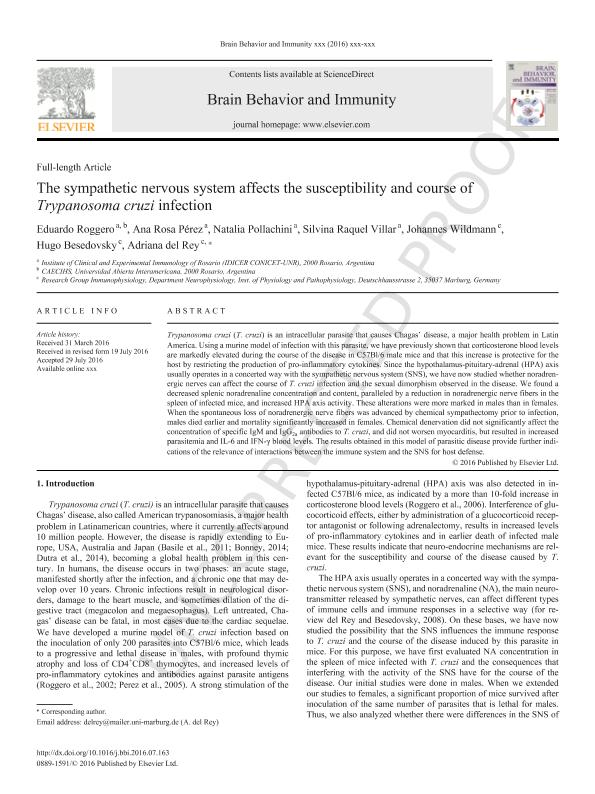Artículo
The sympathetic nervous system affects the susceptibility and course of Trypanosoma cruzi infection
Roggero, Eduardo Angel; Perez, Ana Rosa ; Pollachini, Natalia; Villar, Silvina Raquel
; Pollachini, Natalia; Villar, Silvina Raquel ; Wildmann, Johannes; Besedovsky, Hugo; del Rey, Adriana
; Wildmann, Johannes; Besedovsky, Hugo; del Rey, Adriana
 ; Pollachini, Natalia; Villar, Silvina Raquel
; Pollachini, Natalia; Villar, Silvina Raquel ; Wildmann, Johannes; Besedovsky, Hugo; del Rey, Adriana
; Wildmann, Johannes; Besedovsky, Hugo; del Rey, Adriana
Fecha de publicación:
11/2016
Editorial:
Academic Press Inc Elsevier Science
Revista:
Brain Behavior And Immunity
ISSN:
0889-1591
Idioma:
Inglés
Tipo de recurso:
Artículo publicado
Clasificación temática:
Resumen
Trypanosoma cruzi (T. cruzi) is an intracellular parasite that causes Chagas’ disease, a major health problem in Latin America. Using a murine model of infection with this parasite, we have previously shown that corticosterone blood levels are markedly elevated during the course of the disease in C57Bl/6 male mice and that this increase is protective for the host by restricting the production of pro-inflammatory cytokines. Since the hypothalamus-pituitary-adrenal (HPA) axis usually operates in a concerted way with the sympathetic nervous system (SNS), we have now studied whether noradrenergic nerves can affect the course of T. cruzi infection and the sexual dimorphism observed in the disease. We found a decreased splenic noradrenaline concentration and content, paralleled by a reduction in noradrenergic nerve fibers in the spleen of infected mice, and increased HPA axis activity. These alterations were more marked in males than in females. When the spontaneous loss of noradrenergic nerve fibers was advanced by chemical sympathectomy prior to infection, males died earlier and mortality significantly increased in females. Chemical denervation did not significantly affect the concentration of specific IgM and IgG2a antibodies to T. cruzi, and did not worsen myocarditis, but resulted in increased parasitemia and IL-6 and IFN-γ blood levels. The results obtained in this model of parasitic disease provide further indications of the relevance of interactions between the immune system and the SNS for host defense.
Palabras clave:
Chagas disease
,
Denervation
,
HPA Axis
,
Sympathetic nervous system
Archivos asociados
Licencia
Identificadores
Colecciones
Articulos(IDICER)
Articulos de INSTITUTO DE INMUNOLOGIA CLINICA Y EXPERIMENTAL DE ROSARIO
Articulos de INSTITUTO DE INMUNOLOGIA CLINICA Y EXPERIMENTAL DE ROSARIO
Citación
Roggero, Eduardo Angel; Perez, Ana Rosa; Pollachini, Natalia; Villar, Silvina Raquel; Wildmann, Johannes; et al.; The sympathetic nervous system affects the susceptibility and course of Trypanosoma cruzi infection; Academic Press Inc Elsevier Science; Brain Behavior And Immunity; 58; 11-2016; 228-236
Compartir
Altmétricas



